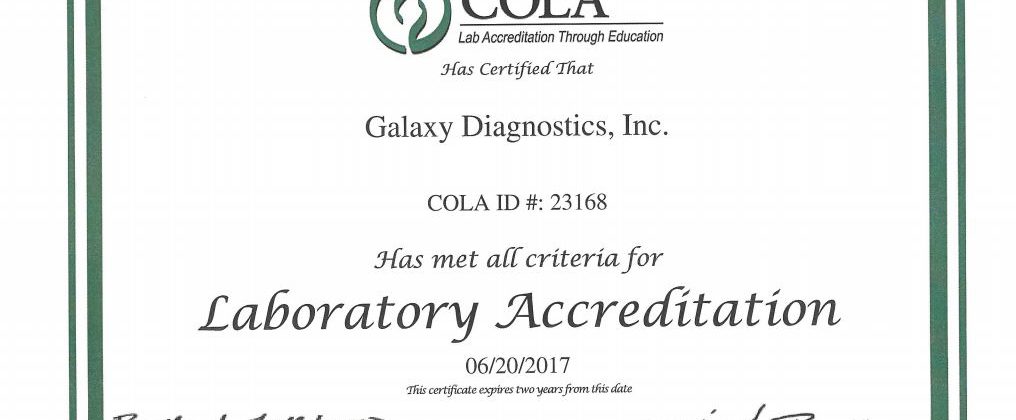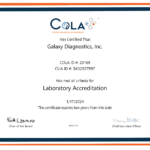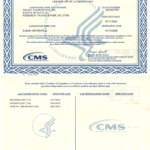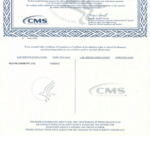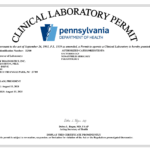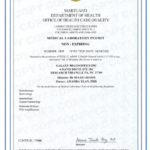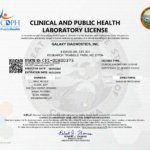Revised July 26, 2021
Galaxy Diagnostics, Inc. provides highly sensitive, enhanced detection of vector-borne infections using optimized direct and indirect detection test methods including sample enrichment, liquid culture, PCR, and serology. We perform diagnostic assays for both Animal Health and Human Health under strict quality control testing standards in a COLA accredited CLIA laboratory (COLA 23168; CLIA 34D2027997; PDH 32300; DHMH 1828; COS 800375). We follow exemplary laboratory practices regarding personnel qualifications and experience, facility and equipment maintenance, and protocol validation as defined by federal regulations governing laboratory testing for human health in the United States (Clinical Laboratory Improvement Amendment, 1998, 2002). For more information on laboratory standards, please see the Centers for Medicare/Medicare Services website – https://www.cms.gov/CLIA/. Additional information is available at www.COLA.org.
Personnel
Our Laboratory Director is a CLIA-qualified High Complexity Laboratory Director, with a PhD in Immunology, a BS in Medical Technology, MS in Biology, and over 20 years of high complexity laboratory testing experience and 13 years as a CLIA-qualified High Complexity Laboratory Director. Our Medical Advisors include experts in diagnosis and treatment of bartonelloses and other hard to diagnose infections (DVM for Animal Health and MD for Human Health). Our minimum educational standard for laboratory personnel is either MLT certification or a BS in biological science and all personnel are formally trained on Standard Operating Procedures, Blood-borne Pathogens/Laboratory Safety, and Quality Assurance Procedures regarding sample handling, processing, and reporting.
Facilities & Equipment
Our laboratory and equipment are maintained according to COLA/CLIA standards, including temperature and humidity monitoring, routine calibration of instruments and equipment, and the use of biosafety cabinets for microbial culture and PCR hoods for pre‐ and post‐PCR processing. Human and animal samples are processed in separate incubators, DNA extractors, and PCR runs, and stored in separate freezers as an additional engineering control.
Protocol Validation
In order to establish the performance characteristics of each CLIA-validated assay, we assess test accuracy and precision and measure both analytical and clinical sensitivity and specificity. Our test methods are classified as “validated in house” following standards set by CLIA regulations and other best practice standards in molecular microbiology and immunology: (1) ongoing documentation of internal or inter- laboratory performance using known reference standards for the species and/or diagnostic specimens of interest; (2) publication of novel methods in a peer-reviewed journal with sufficient documentation to establish diagnostic performance and interpretation of results; and (3) documentation of internal or inter-laboratory comparison to an accepted methodology or protocol.
Bartonella Digital ePCR™ (BAPGM™ Enrichment and ddPCR)
In order to pre-enrich samples for Bartonella species, we use a novel enrichment medium called Bartonella alpha-Proteobacteria Growth Medium (BAPGM™), developed and described in peer-reviewed literature by researchers with an established global expertise in the field of emerging vector-borne disease, most notably Bartonella spp infection, at North Carolina State University College of Veterinary Medicine. BAPGM™ serves as the foundation for a novel testing platform which combines enrichment culture with pre- and post-culture ddPCR testing for confirmation of infection. This novel test platform provides enhanced detection of Bartonella DNA missed by conventional PCR detection methods and is currently the most effective means of Bartonella spp. DNA detection offered anywhere in the world. Cultured Bartonella organisms are used for culture positive standards and to generate standardized ddPCR positive control samples. Quality assurance for BAPGM™ liquid culture is verified for each test run by consistent use of both positive and negative control samples in addition to positive and negative controls for ddPCR.
Droplet Digital PCR (ddPCR)
Validated diagnostic ddPCR assays currently offered include those for genus-level detection of Bartonella species. This technology offers highly sensitive direct detection of low-abundance, slow-growing microorganism DNA through sample partitioning. Test samples are partitioned into ~20,000 droplets prior to performing PCR on each, reducing inhibition from host DNA. Quality assurance for ddPCR is verified with each testing run by consistent use of positive and negative control samples. Quantified Bartonella DNA are used for ddPCR positive standards.
qPCR
We also perform real-time qPCR assays for genus-level detection of Bartonella, Rickettsia, Ehrlichia, Anaplasma, and Babesia/Theileria species. Quality assurance is verified for each test run by consistent use of both positive and negative control samples. Quantified Bartonella DNA and quantified Rickettsia, Ehrlichia, Anaplasma, and/or Babesia plasmid DNA are used for qPCR positive standards. Presumptive positive qPCR results from clinical samples are further characterized and confirmed by DNA sequencing performed by the CLIA-accredited division at Genewiz, Inc (South Plainfield, NJ).
Lyme Borrelia Nanotrap® Antigen Test
The Nanotrap® Antigen Test is an enhanced direct detection test method that confirms active Lyme Borrelia infection. Nanotrap® particles (manufactured by Ceres Nanosciences) capture and concentrate the Borrelia OspA antigen shed within urine prior to confirmation using a highly sensitive Western blot. Cultured Borrelia organisms are used to generate standardized positive control samples. Quality assurance for Nanotrap® particle performance is verified for each test run by consistent use of standardized, qualified positive and negative control samples.
Bartonella Serology
Indirect immunofluorescence assay (IFA) testing for bartonellosis determines the presence or absence of antibodies to a single Bartonella species within human serum. Clinically, measured antibody levels are generally considered to be indicative of an individual’s prior or current immune response against a specific pathogen. The presence of antibodies indicates that a patient has been exposed to a particular species of Bartonella. IFA serology tests have been approved as a useful tool for identifying patient exposure to B. henselae, B. quintana, B. vinsonii berkhoffii, and B. koehlerae. Additionally, our IFA tests demonstrated limited cross-reactivity to Anaplasma phagocytophilum, Borrelia, Ehrlichia, Rickettsia and Coxiella burnetii. Quality assurance for B. henselae, B. quintana, B. vinsonii berkhoffii, and B. koehlerae IgG IFA performance is verified for each test run by consistent use of standardized, qualified positive and negative control serum samples.
Bartonella IFA serological testing for animal health is currently outsourced to the Vector-borne Disease Diagnostics Laboratory (VBDDL) at NC State University College of Veterinary Medicine.
Borrelia Serology
We currently perform the CDC-recommended Two Tier Testing (TTT) for Borrelia burgdorferi. The first set of tests are IgM and IgG enzyme-linked immunoassays (ELISAs) confirmed by the second-tier tests consisting of IgM and IgG Western blots. The validation of both methods consisted of both analytical and clinical performance of the assays. The purpose of both the ELISA and Western blot tests contained within our two-tier testing platform is to assess whether patient serum samples contain IgM or IgG antibodies that react with the Lyme disease agent Borrelia burgdorferi. This two-tier B. burgdorferi testing platform adheres to the currently defined reference testing algorithm for Lyme disease testing and results are interpreted conservatively according to current CDC guidelines. Additional bands are reported upon request by the ordering clinician. As documented in literature, serum samples from patients with Epstein-Barr viral infections (mononucleosis), rheumatoid arthritis, or that have had other spirochetal infections (e.g. periodontitis, syphilis) may exhibit cross-reactivity with B. burgdorferi IgM or IgG ELISA and Western blot assays. Quality assurance for B. burgdorferi IgM and IgG ELISA and Western blot assays is verified with each test run by consistent use of standardized, qualified positive and negative control serum samples.
For questions, please contact the lab at 919-313-9672 or email contact@galaxydx.com.

